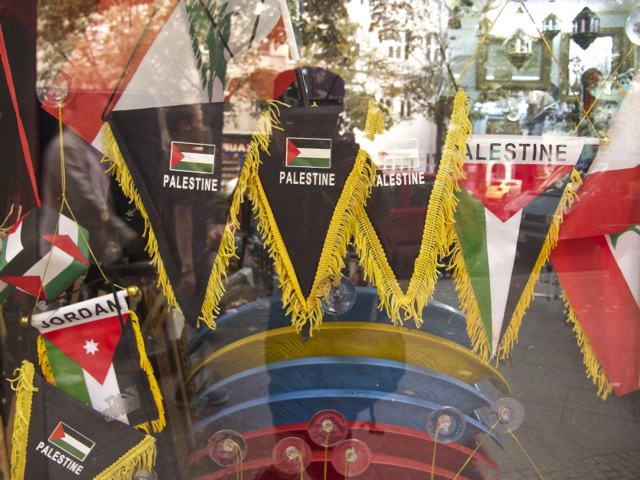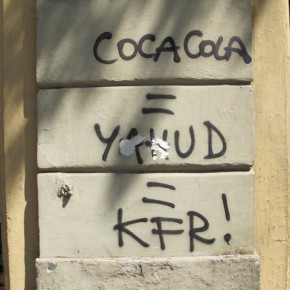June is shaping to be a very eventful month. The crisis in Syria continues to swell, with no end in sight. The dilemmas facing the United States, Israel and Europe seem to be getting more complicated by the day. Iran will hold its next presidential election, and with the departure of Mahmoud Ahmadinejad from that office the United States will be faced with a new set of questions, depending on the outcome. And Israel’s occupation of Palestinian territory (and, one should add, Syrian territory on the Golan Heights as well) will “celebrate” its 46th birthday.
But as the occupation enjoys one last moment in the cold sun of US attention, the Palestinians are being presented with an opportunity to shift to a new strategy that might prove much more fruitful than the US-centric one they have been pursuing. Because, while the Iran and Syria situations are escalating, Israeli-Palestinian peace is about to lose its significance. John Kerry made that clear when, speaking at a Jerusalem press conference last week.
“Let me just say to everybody I know this region well enough to know that there is skepticism,” Kerry said. “In some corridors, there’s cynicism. And there are reasons for it. There have been bitter years of disappointment. It is our hope that by being methodical, careful, patient – but detailed and tenacious – that we can lay out a path ahead that could conceivably surprise people, but certainly exhaust the possibilities of peace. That’s what we’re working towards, and I thank the Prime Minister for his serious commitment to this endeavor.”
Every indication points to a US desire to get away from brokering these talks. The Palestinians remain divided, and if the Palestinian Authority did agree to a unity government with Hamas, the United States would find it very difficult to deal with them, if not impossible, thanks to the Palestinian Anti-Terror Act of 2006, which prohibits any US interaction with Hamas. Israel is continuing to expand settlements and refuses to negotiate unless the Palestinians accept beforehand that the major Israeli settlement blocs which cut the West Bank into pieces are established and unchangeable facts on the ground.
Palestinian President Mahmoud Abbas has lost almost all of his credibility among his own people, and Hamas has no program for any short-term resolution of the conflict. Israel’s majority coalition includes two parties, Likud (whose party platform states: The Government of Israel flatly rejects the establishment of a Palestinian Arab state west of the Jordan river) and HaBayit HaYehudi, which oppose the two-state solution; another, Yisrael Beiteinu, which wants to expel Israel’s Arab citizens in a two-state agreement; and a fourth, Yesh Atid, which only supports a two-state solution where Israel keeps all of Jerusalem and brooks no concessions at all on the issue of Palestinian refugees.
With Russia upping the ante in Syria and the Assad regime regaining momentum in the civil war, the United States will face mounting pressure to increase its involvement. Israel wants to see that situation managed, but has to be very careful about interference in Syria, which could be explosive in unpredictable ways. On Iran, whatever the results of the presidential election may be, they will mean either a renewal or reassessment of US-Israeli strategy. Given that Israel is clear that negotiations cannot possibly come close to minimal Palestinian demands, the US and Israel would like to either resume talks that will lead nowhere or bury the issue.

The preference, at least in Washington, is doubtless the former. However, the US government also knows that such talks, without any Israeli concessions beforehand on settlement expansion and Palestinian prisoners, would mean the end of Abbas. So instead, Kerry is “exhausting the possibilities of peace.” Because in June or July, when things ratchet up another notch or two in Syria (possibly including Israeli involvement,) and the US and Israel update their respective courses on Iran, the Palestinian issue will be dead, and can be put to rest behind the cloak of those other conflicts.
The motivation for the US is different from that of Israel. Prime Minister Netanyahu is not interested in ending the occupation, and has always preferred to “manage” the Palestinians. Washington would rather end the occupation, but realizes that without taking politically prohibitive steps (i.e., taking on the Israel Lobby) this is not feasible. So, consistent with Obama’s broader desire to focus on Asia rather than the Middle East, the US government is trying to de-prioritize the Palestinian crisis.
Yet, the headlines all proclaim that John Kerry is going all out to resolve this conflict. If something miraculous happens, and there are purposeful negotiations with an actual endgame in sight, nothing more would please Kerry. But make no mistake: no matter what the headlines say, the Secretary of State, and President Obama are trying to write the final chapter of the Israel-Palestine conflict, without any faith in the possibility of its resolution. Despite the noir, this is a potential positive for the Palestinians.
If Washington’s eyes move elsewhere, the Palestinians can try to convince the EU to adopt the measures recently endorsed by the European Eminent Persons Group which are sensible, and many of which are necessary, if there is ever to be progress. For example, in the letter the EEPG sent to the EU High Representative for Foreign Affairs, Catherine Ashton, the EU was urged to formally recognize that the Palestinian Territories are under occupation, imposing on Israel the legal obligations of that status. This is a clear statement that all Israeli settlements beyond the 1967 border be recognized as illegal, and that only this border can be a starting point for negotiations; and, most importantly, that the EU should actively support Palestinian reunification.
The US cannot call for any of those measures, but most officials in the White House, State Department, Defense Department and pretty much any office outside of AIPAC-dominated Congress are well aware that they are necessary and should be welcomed. The notion that there is any possibility of peace while the Palestinians are split between Fatah and Hamas is simply ridiculous. But, even more ridiculous, is the US’ refusal to endorse any healing of this breach, which, by the way, it is largely responsible for.
Brussels, however, could call for these measures, and could work with the Arab League, possibly even Russia (Russia’s current position regarding Syria may make that problematic, though not inconceivable) to create the kind of pressure necessary for progress. But the European Union will need to be pushed to do it. And that is up to the Palestinians to make happen.
A Palestinian push to get Europe to take a firmer stand with Israel has some real potential. The EU faces considerable internal political obstacles, but nothing like the paralyzing force of the Israel Lobby in Washington. There is considerable support, both popular and elite, in Europe for ending Israel’s occupation, and for the steps, like Palestinian reunification, and Israel being forced to acknowledge that its settlements beyond the Green Line are illegal.
One can only hope that the Palestinian leadership can seize this opportunity. It seems unlikely. Still, if ever there was a time for a new Palestinian leadership to emerge, this is it. But maybe the extant leaders, at least some of them, can find a way to pursue this course, together, bridging the divides that exist between Hamas and Fatah. They will have some incentive, because as the situation is shaping up, the US and Israel seem to be positioning the Palestinians as the party to blame for the failure to re-start talks.
Photographs courtesy of Joel Schalit





